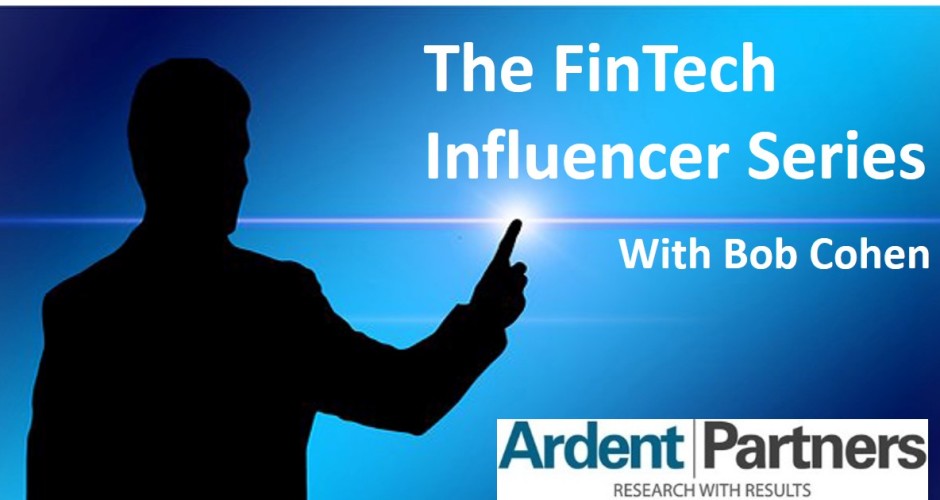Ardent’s FinTech Influencer Series highlights innovative voices in the world of Accounts Payable (“AP”) automation. This series is the go-to spot for progressive thoughts on how technology, transformational thinking, and revolutionary ideas are changing how AP work gets done. We continue our FinTech Influencer Series today with Part 2 of our conversation with Andres Ricaurte, SVP & Global Head of Payments, at Mphasis. (Click here to read Part 1).
Bob Cohen: What should would be paying attention to now and in the future (technologies, trends, etc.)?
Andres Ricaurte: First, SaaS. Businesses of all sizes are increasingly adopting cloud applications to shrink their technology footprint and become more agile to respond to market and customer demands. Initially looked at with skepticism, cloud is now permeating even the most mission-critical business functions such as Enterprise Resource Planning (ERP), Treasury, Accounting and Finance. As a result of SaaS, terabytes of new digital data are being created daily. This data holds the key to unlocking major efficiencies in the way businesses and entire industries operate. From deriving real-time cash flow insights to anticipating potential breakdowns in the supply chain, B2B payment decisions are starting to become more intelligent and dynamic.
Another major trend is cognitive automation, through which operations-heavy processes like reconciliation and exceptions handling are being transformed into lines of code that require zero human intervention. Due to the scale economics of cloud-based services, we see these advances being made available not just to large enterprises, but also to middle market and small business customers. As companies of all sizes continue to transform their operations, we are finally beginning to scratch the surface of truly digital B2B commerce workflows.
Just like mobile devices changed the way people interact with payments products, the rapid adoption of SaaS and cognitive automation technology is changing the expectations that businesses have from their payments providers. In other words, the features we take for granted when we think of consumer transactions are increasingly becoming table stakes for B2B.
Providers that are unable to adapt their payments platforms to this new reality will see their customers’ loyalty dwindle. It is therefore no surprise that investments in payments transformation have been growing exponentially among the B2B financial services industry. Leading the pack are those that recognize that the key is not to digitize old products but to design new ones that are digital-native, supported by a platform-first approach to effectively compete in what is increasingly becoming open FinTech ecosystem.
Looking further ahead, blockchain technologies like tokenization and zero-knowledge-proof are creating new ways to transfer financial value and information within and across B2B networks. As these technologies continue to evolve, we will see how traditionally complex industries, such as trade finance and insurance, get completely re-imagined.
BC: As an executive at a FinTech solution provider, what keeps you up at night (good or bad)?
AR: Open banking and privacy regulation. Open banking is exciting because it creates new strategic opportunities for everyone. Banks can leverage it to distribute products into existing ecosystems, which makes other software providers like ERPs and Procurement systems the natural point of payments aggregation. Alternatively, banks can create primary interfaces for financial management which then leverage shared payments infrastructure. In both cases, these solutions will require a smarter, more flexible payments grid which will drive important modernization at the core infrastructure level.
Privacy regulations create an interesting opportunity for all of us in the FinTech space because it is a natural moment for our clients to re-assess their data infrastructure and strategy. Which data should be ‘eyes-only’, which should be federated, and how do we share data in a compliant way while creating the right experience for our end users? These are all tough and exciting questions that will help our industry pave the way towards smarter, more secure payments services that put the customer at the center of every transaction
BC: On a personal note, what is your favorite book and why do you like it?
AR: Yuval Noah Harari’s “Sapiens: A Brief History of Humankind”. Being in payments, it is hard not to constantly think about the transformation of complex ecosystems and the forces that drive them. What better example than the cognitive, agricultural and scientific revolutions and their impact to humankind itself.
BC: Thanks Andres for your time and insight on the market.







Comments are closed.